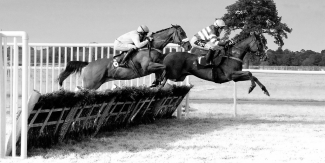The Racist Truth of The Kentucky Derby

America’s popular horse racing event, the Kentucky Derby, is steeped in racism.
Formerly enslaved Black men - who, during slavery, were tasked with raising prized cattle and horses, work whites deemed beneath them - were enlisted as jockeys for the race.
This would prove a lucrative career path for Black men.
With 13 of 15 Black jockeys racing in the 1875 inaugural Derby, this soon became the norm. Black men rode atop horses they trained, and with their knowledge and experience, dominated the field.
Money flowed in, and their celebrity boomed amongst white and Black fans alike.
Such admiration, however, bothered racist whites who hated seeing Black men thrive and succeed.

1896 was a dark time for Black people across the South. The Supreme Court backed Plessy v. Ferguson that year, a decision that would catapult the region into segregation.
Black jockeys soon dwindled in America’s most popular sporting event of the day.
Thanks to Black jockeys, the Kentucky Derby rose to fame. But with that rise came white envy and a subsequent great fall.
From 1921 to 2000, no Black jockeys raced in the event they put on the map.
The Kentucky Derby today is still racist.
Attendees now sing an anthem celebrating slavery instead of celebrating the Black jockeys who launched the event’s success - a true American tradition.
The Racist Truth of The Kentucky Derby
&
How African-Americans Disappeared From the Kentucky Derby | History | Smithsonian Magazine

America’s popular horse racing event, the Kentucky Derby, is steeped in racism.
Formerly enslaved Black men - who, during slavery, were tasked with raising prized cattle and horses, work whites deemed beneath them - were enlisted as jockeys for the race.
This would prove a lucrative career path for Black men.
With 13 of 15 Black jockeys racing in the 1875 inaugural Derby, this soon became the norm. Black men rode atop horses they trained, and with their knowledge and experience, dominated the field.
Money flowed in, and their celebrity boomed amongst white and Black fans alike.
Such admiration, however, bothered racist whites who hated seeing Black men thrive and succeed.

1896 was a dark time for Black people across the South. The Supreme Court backed Plessy v. Ferguson that year, a decision that would catapult the region into segregation.
Black jockeys soon dwindled in America’s most popular sporting event of the day.
Thanks to Black jockeys, the Kentucky Derby rose to fame. But with that rise came white envy and a subsequent great fall.
From 1921 to 2000, no Black jockeys raced in the event they put on the map.
The Kentucky Derby today is still racist.
Attendees now sing an anthem celebrating slavery instead of celebrating the Black jockeys who launched the event’s success - a true American tradition.
The Racist Truth of The Kentucky Derby
&
How African-Americans Disappeared From the Kentucky Derby | History | Smithsonian Magazine
Last edited:


 History lesson.
History lesson.